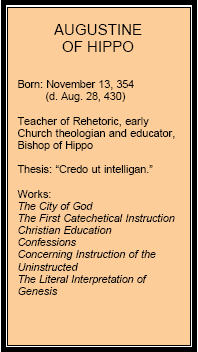Augustine of Hippo was one of the foremost philosophers and theologians of early Christianity. He had a profound influence on the subsequent development of Western thought and culture and, more than any other person, shaped the themes and defined the problems that have characterized the Western tradition of Christian theology. Augustine received a classical education that both schooled him in Latin literature and enabled him to escape from his provincial upbringing.

Augustine of Hippo
“Credo ut intelligam.†(I believe in order to understand)

Trained at Carthage in rhetoric he became a teacher of rhetoric in Carthage, in Rome, and finally in Milan. His subsequent career as priest and bishop was to be dominated by controversy and debate. Augustine’s influence on Christian education was formative. His work, Christian Education, provided a manual of instruction for Christian teachers, both clergy and lay. It provided a philosophical base for interpreting the Scripture and gave techniques for teaching. It was a work of considerable pedagogical importance, and it remained a classic for Christian educators for centuries.
While valuing reason as the one thing that sets human above all creation, he nonetheless emphasized the primacy of faith. Understanding follows faith, he believed. But this did not lessen the need to use reason, especially to avoid over reliance on the sense perceptions. Reed and Prevost summarized Augustine’s educational views:
- the teacher should help the student experience God
- the teacher should take into account the unique characteristics of each student and relate to the students as unique individuals
- Christian education should include the study of Plato, for most Christian doctrines were contained in his writings
- understood the image of God in persons as their rational nature, thus it was to be used as a tool to relate them to God
- distrusted the senses as a means to knowledge and urged the use of reason instead
- in the tension between faith and reason, faith must predominate.
In Augustine’s view, the teacher was key to effective, formative education. He argued that the teacher’s attitude would determine the student’s enthusiasm for learning, and that good teaching skills were critical. In fact, he argued that it was better not to teach than to teach ineffectively and with a poor attitude. As an educational thinker, Augustine transcended his generation to make an enduring contribution. His impact continues to be felt today.

SOURCES:
Reed and Prevost, A History of Christian Education (1993)
Gangel and Benson, Christian Education: Its History & Philosophy (1983)
Battenhouse, Roy, ed., A Companion to the Study of St. Augustine (1955)
Brown, Peter, Augustine of Hippo (1967; repr. 1987)
Chadwick, Henry, Augustine (1986)
Marrou, H. I., St. Augustine and His Influence Through the Ages, trans. by P. Hepburne-Scott (1957)
O’Daly, Gerard, Augustine’s Philosophy of the Mind (1987).

2 Responses to World’s Greatest Christian Educators: Augustine of Hippo